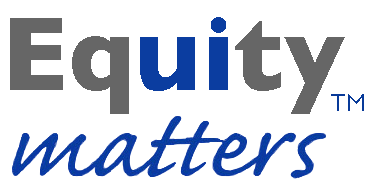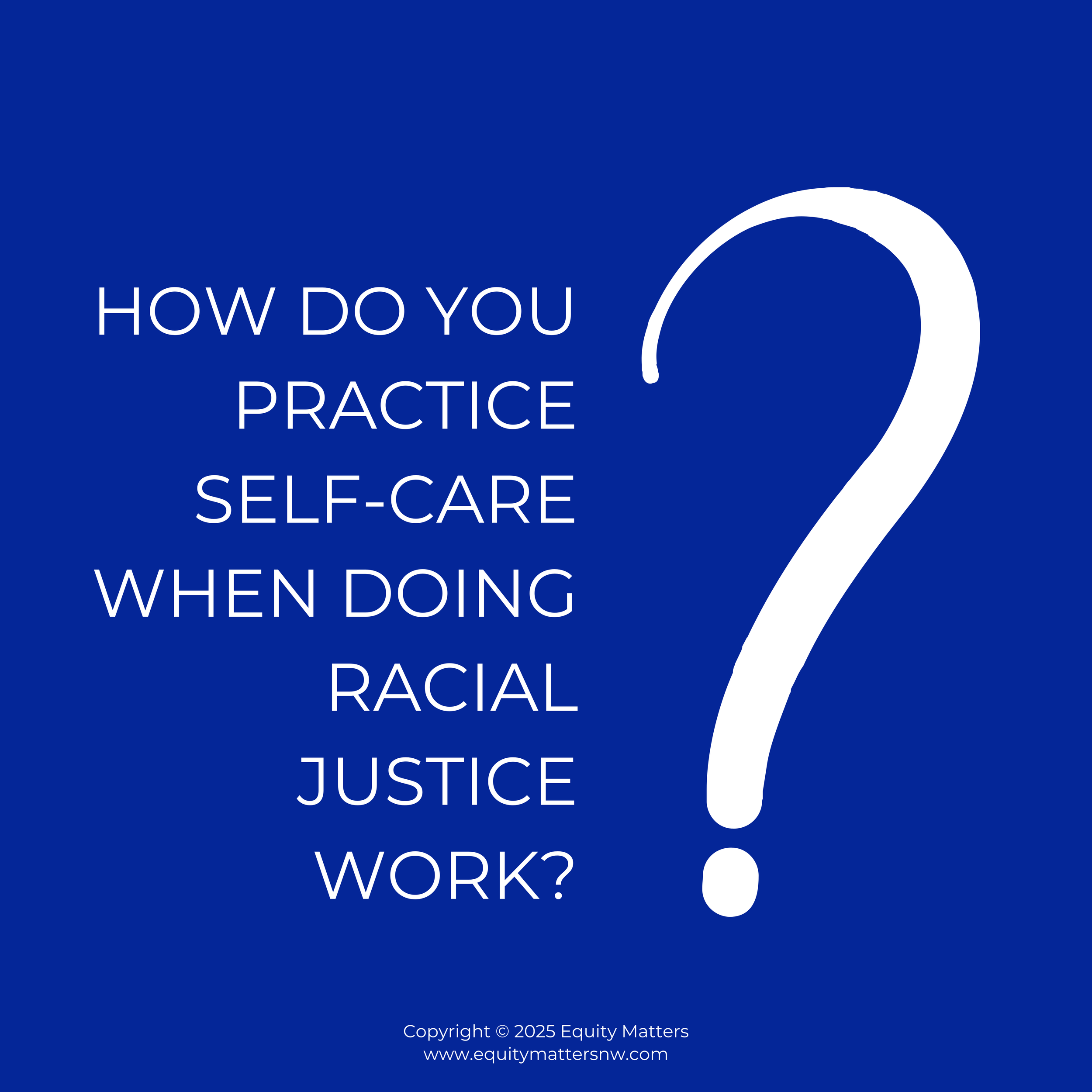How do you practice self-care when doing racial justice work?
April's blogging prompt comes courtesy of LaToya.
We deeply believe in collective care while also recognizing that self-care has its own essential place within the broader system of care. For our team of Black and Asian women, self-care is especially vital. Historically, Women of Color have often been led to believe that their fulfillment comes primarily from caring for others.
To all the Women of Color in our community, how do you nurture yourselves while engaging in racial justice work?
LaToya: Racial justice work is powerful, necessary, and deeply personal. It demands resilience, persistence, and an unwavering commitment to change. But the truth is, this work can also be exhausting—mentally, emotionally, and physically. That’s why self-care isn’t just an afterthought; it’s a strategy for sustainability and healing.
Healing is an essential part of self-care, especially when engaged in racial justice work. The fight against systemic oppression often takes a toll on our minds and bodies. Prioritizing self-care isn’t just about maintaining energy; it’s about restoring ourselves so that we can continue to show up fully in our work and communities.
My journey with intentional self-care began in 2016 with something simple yet transformative: daily 30-minute walks. I joined GirlTrek’s Black History Bootcamp, a movement that encourages Black women to walk in honor of our ancestors and our well-being. Each step felt like an act of resistance, a moment of connection, and a way to process the weight of the work I was doing.
From there, my practice evolved. I took on a 50 squats-a-day challenge in the fight against Breast Cancer, channeling my energy into movement with intention. Over the years, I leaned into meditative practices, focusing on breathwork to recenter myself when the work felt overwhelming.
Then, in January 2024, I began strength training. At the start, push-ups, chin-ups, and pull-ups felt impossible. But I stayed committed. Day by day, I built not just my physical strength but my mental and emotional endurance as well. Today, I can lift 130 pounds—a number that once seemed unimaginable. This practice has reinforced the connection between physical strength and emotional resilience; reminding me that taking care of my body is an act of self-preservation and power.
Self-care isn’t just about individual healing—it’s also about the collective support that sustains us. I make it a priority to dedicate at least one day a month (often more) to be in community with my village—two incredible women of color who help to keep my cup overflowing. These gatherings are sacred. We spend time breaking bread together, nourishing our spirits while intentionally supporting Businesses of Color. Whether it’s a bookstore, a restaurant, or an artist’s collective, we seek out Black, Indigenous, and people of color (BIPOC)-owned businesses to uplift their work and expand our knowledge of the powerful contributions of our communities.
These moments of rest, reflection, and shared joy are just as important as the work itself. They remind me that we don’t have to carry the weight of change alone—that we can lean on each other, celebrate each other, and build together.
For me, self-care is not about escape; it’s about restoration and resistance. It’s about reclaiming my body, my breath, my joy, and my time in a world that too often demands more than it gives. This journey has taught me that taking care of myself is not separate from the fight for justice; it’s part of it.
To those doing this work: How are you taking care of yourself? How are you pouring back into yourself so that you can continue pouring into others? Let’s remind each other that our well-being matters just as much as the change we’re fighting for.
Chalon: Doing racial justice work is a necessity to my existence as well as the existence of those around me, but it is also a labor of love. I have had to recognize the toll of addressing oppression and how it impacts me emotionally, physically, cognitively, and spiritually. I engage in self-care to engage in self-awareness and self-regulation as tools to maintain harmony and prevent burnout. I participate in activities that bring me joy: travel, cook, indulge in nature, watch my favorite sports, and spend time with family and friends. I also pour into my spirit through worship, praise, and biblical study. Physically, I try to exercise, which sometimes includes chasing my two-year-old as she explores the world. Cognitively, I read books for pleasure as well as for education. All these activities fall under radical self-care. A term with historical roots was seen as a much-needed practice among activists who sought to propel social justice efforts while preserving their well-being. Radical self-care is rooted in the principles of self-determination, self-preservation, and self-restoration. I practice radical self-care as an act of resistance to conditions of inequality, marginalization, and minoritization. I encourage all to engage in it as well.
CiKeithia: Self-care is, first and foremost, recognizing my capacity to do this work and do it well. I do not take on more than I feel is reasonable, and I make conscious choices in the contracts I select. I intentionally choose contracts that are not just focused on building knowledge but also on repair, justice, and joy.
In session facilitation also means taking care to ensure that BIPOC participants are centered and are not harmed.
Finally, I seek joy outside of work and remind myself of the power of making change even when it feels like I will not see it in my lifetime.
Heidi: The surface-level answer to the self-care question is simple: I ride my bike and I drink beer. Most people know that about me. And honestly, I don’t want to downplay those two things because they’ve played an important role in my life. But when I dig a little deeper into what self-care really looks like for me—especially in my racial justice work, I think it starts with getting Sitka, a.k.a. Goose (my dog). And then, of course, the transformation of becoming a parent to a human child, specifically, an older, very tired parent to a human child.
I used to be the kind of person who wouldn’t let dishes pile up in the sink. Laundry never sat in the dryer for long. And now? Well… sometimes the laundry stays in the dryer for days. Sometimes the dishes don’t get done. And our couch? Let’s just say it’s seen better days. The bigger lesson here? Letting go of control. Letting go of perfectionism. Embracing the mess—both literally and figuratively.
This shift hasn’t just played out in my personal life (where a dog and a tiny human now rule my home). It’s also changed how I approach my racial justice work. Trying to hold on too tightly, trying to control every detail, trying not to internalize the trauma and attacks, has taken a physical toll on my body and a mental toll on my emotions. Working to loosen that grip? That’s been one of my biggest acts of self-care.
Speaking of self-care, I’ve been telling everyone about this new (to me) podcast I’m obsessed with, Dark Woke. The host, Janaya Future Khan, might sound familiar if you’ve ever heard me talk about the penguin spiral—they are the origin of that idea. I love their podcast for so many reasons. They focus on culture work. They are a deep thinker. They bring humor, vision, and critique to the activist world, which is essential in this work.
But you know what else I love? The podcast is long. It’s messy. It’s full of “ums” and “ahs” and roundabout thoughts. It’s “unpolished,” in the best ways. And I think that’s something we don’t see enough of. So often, we try to present the perfect final product—whether it’s a training, a blog post, or a podcast. But maybe we actually need to show more of the messy parts. The unedited moments. The changes of mind. The things that remind people we’re human. And in doing that, maybe we also invite others to be a little more human, too.
So yeah, that’s what self-care has been looking like for me lately: a little less control, a little more letting go.

